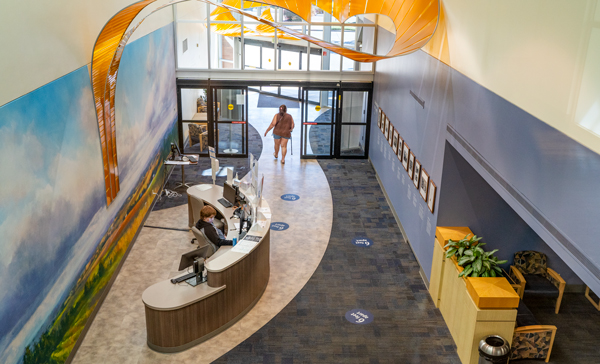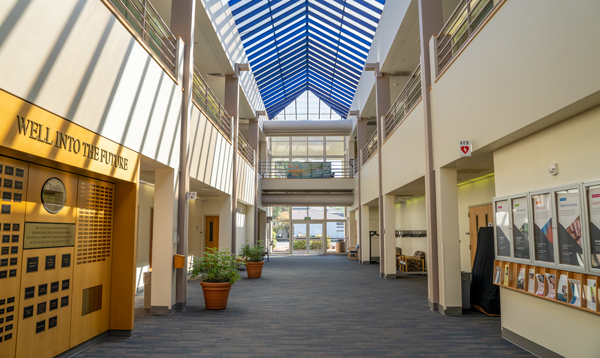Residency Experience
Residents receive robust training in the care of adults with complex medical issues across all subspecialties in inpatient and ambulatory settings.
Rotations
Residents typically rotate through a 2+2 schedule facilitating a customizable schedule that builds foundational skills in inpatient, outpatient and subspecialty medicine while facilitating work-life balance.
During ambulatory weeks, residents have opportunities to work in rural settings and with underserved populations. They also engage in quality improvement, scholarly projects, review population health data and connect with the interprofessional care team.
Postgraduate Year One (PGY-1) Intern
- Inpatient Internal Medicine: 20 weeks
- Ambulatory Medicine: 18 weeks
- ICU: 4 weeks
- Consults: 4 weeks
- Vacation: 4 weeks
Postgraduate Year Two (PGY-2)
- Ambulatory Medicine: 17 weeks
- Inpatient Internal Medicine: 12 weeks
- ICU: 4 weeks
- Consults: 7 weeks
- Elective: 6 weeks
- Emergency Medicine: 2 weeks
- Vacation: 4 weeks
Postgraduate Year Three (PGY-3)
- Ambulatory Medicine: 17 weeks
- Inpatient Internal Medicine: 12 weeks
- Elective: 9 weeks
- Consults: 6 weeks
- ICU: 4 weeks
- Vacation: 4 weeks
Rotation descriptions
Medicine outpatient is the core ambulatory rotation of the residency program, occurring every two weeks in the X+Y structure. Residents work with a panel of patients in the 8th Avenue Primary Care and learn key principles of primary care.
8th Avenue Primary Care, along with Hillsboro Medical Center’s three other primary care clinics, all achieved Tier 5 recognition as a Patient-Centered Primary Care Home by Oregon Health Authority. Tier 5 is the highest recognition the Oregon Health Authority quality program awards.
Residents typically have half days of primary care clinics, where they care for their own panel of patients working in collaboration with a multidisciplinary team that includes behavioral health specialists, panel coordinators, nurses and pharmacists.
The rotation also supports experiences in Internal Medicine subspecialty training, including Cardiology, Endocrinology, Pulmonary Medicine, Geriatric Medicine, Sleep Medicine and more. Subspecialty experiences vary based on the year of training.
Residents also have a protected half day of admin time to manage their in-basket, quality improvement projects and research.
Our unique Rural Underserved and Social Determinants of Health (RUSH) curriculum is integrated in ambulatory blocks throughout the three-year training period. It includes opportunities to work with:
- ¡Salud! Services to bring health care to seasonal vineyard stewards
- Virginia Garcia Memorial Health Center, a Federally Qualified Health Center for underserved populations
- Behavioral health
- Hepatitis C and HIV clinic
- Community outreach opportunities
Residents will also have access to an asynchronous medical Spanish course and will receive training in culturally responsive care, the management of healthcare disparities and implicit bias.

Hillsboro Medical Center patient entrance
Residents will have a robust inpatient experience at Hillsboro Medical Center. They will work closely with hospitalists, gaining invaluable experience caring for a broad spectrum of clinical conditions and serving a diverse patient population.
Residents also have the opportunity to work with medical students, which enables them to enrich the learning environment and hone their teaching skills. The inpatient experience is bolstered by a strong interprofessional approach, including collaboration with care management, nursing, rehabilitation and social work.
Inpatient hospital medicine experiences include:
- Opportunities to work as part of a traditional team structure (1 senior/1 intern or 1 senior/2 intern teams)
- Working directly with the attending as a PGY2 or PGY3 resident
- Night float and swing rotations
The opportunity to craft rotations to fit a resident’s interests is a core tenet of the program. Residents can choose among a number of rural electives or local experiences.
Residents have time to elect experiences that align with career goals in various focus areas and subspecialties.
Current elective offerings include:
- Consult rotations
- Subspecialty clinics
- Hospital Medicine co-attending
- Swing
- Skilled Nursing Facility
- Astoria Primary Care (rural and coastal site)
- Astoria Inpatient Medicine (rural and coastal site)
- Point-of-care Ultrasound (POCUS)
- Cardiovascular ICU (at OHSU)
- Neurosurgical ICU (at OHSU)
- Research elective
- Medical education elective
- Lifestyle medicine
- Clinical Informatics
- Palliative Care
- American Indian/Alaska Native Elective
Residents will have experiences in various internal medicine subspecialties including:
- Addiction Medicine
- Cardiology
- Endocrinology
- Hematology-oncology
- Palliative Care
- Pulmonology
- Infectious disease
- Gastroenterology
- Rheumatology
- Nephrology
The rotations are a combination of inpatient and outpatient clinical experiences that are supervised by experienced subspecialists. Residents receive mentorship tailored to align with their career goals, particularly if they are interested in pursuing fellowship.
In their second year, residents complete a two-week Emergency Medicine (EM) rotation at Hillsboro Medical Center, where they work with experienced EM physicians. During this rotation, residents will care for adult patients with broad clinical presentations.
Each academic year, residents will care for critically ill patients during two separate two-week blocks of intensive care. They will take an active role in our ICU interprofessional team that includes an intensivist, nursing staff, care management, and others.

Hillsboro Medical Center Education Center
We have a robust didactic curriculum that covers high-yield internal medicine and internal medicine subspecialty topics.
Our didactics include:
- Resident Case Conference
- Weekly resident-led, case-based presentations focused on developing clinical reasoning skills
- Noon Conference
- Twice weekly presentations covering general internal medicine and subspecialty topics
- Grand Rounds Sessions
- Weekly presentations every Wednesday
- Mastering Tough Conversations Workshops
- In collaboration with TalkOregon
- Resident Morbidity and Mortality Conference
- Practice-Based Learning and Improvement
- Resident Journal Club
- Board Review
- Combined Internal Medicine, Family Medicine, and Transitional Year Curriculum
Evaluations will be tracked on-line and shared with residents. Together with your advisor and our faculty team, we will collaborate over the three years of your training to graduate you as a competent internist who is ready to practice independently upon completion of the program.
Mentorship
Each resident is assigned an advisor from our program leadership team. Residents will work together with their advisors to develop an individualized learning plan, establish goals and track progress.
In addition to the assigned advisor, our program helps residents connect with mentors who align with their career goals and practice interests.
